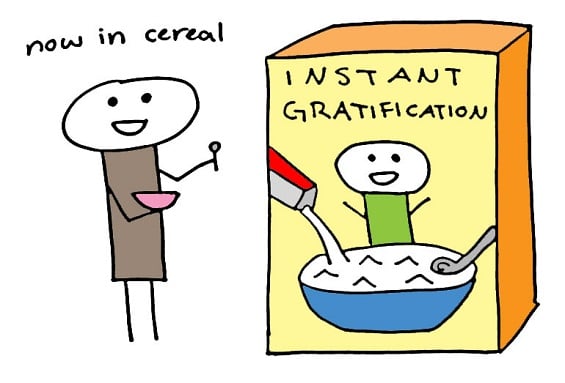The evolution of search – speed or serendipity, instant gratification or personal discovery?

Now, you will have to forgive me for the use of rose-tinted spectacles here but I think I miss the way search engines used to be. In today’s world of instant results and instant gratification, have we all lost the ability to actually hunt for anything online?
Obviously if you want to find out what the longest river in the world is and you are sitting, hiding your Smartphone under the table at the pub quiz, you don’t want to have to wade through page after page of results to get your answer. So an instant result could mean the difference between winning that £50 prize or not. However ask yourself the last time you actually came across something unique and amazing online that hadn’t already been shared 1000 times on Facebook, or forwarded around multiple office emails, or already collated on a social bookmarking site?
Don’t get me wrong, the internet used to be awash with schizophrenic flash interfaces, spam and annoying animated gifs. Since then standardisation of interfaces and improvements in the elimination of spam results have provided an easier way to find information. However, search engines used to require some degree of persistence and actual research in order to unearth what you were looking for. Part of that process meant that you might unearth sites that were unique and different or content that was fresh and interesting.
Social bookmarking and viral emails quickly segued into social content sharing via Facebook or Twitter, and as results become more relevant people relied more and more heavily on social channels for content discovery. This bought with it a sense of sharing in a collective experience but also reduced the chances of individual discovery.
Personalised search and socially recommended search results are supposed to make the experience even more hyper-relevant to you. However, could this simply be creating a self-fulfilling loop of interest and content discovery? You show interest in one thing so you keep getting served the same type of content and results. You keep sharing the same things with your circle of friends so you keep the loop running.
Ultimately the algorithms were engineered to make results more relevant and that has meant that in most instances you get what you’re searching for more quickly. However the next online service that re-introduces the experience of personal discovery will surely help us all rediscover the skills of online research.
An interesting service that caught my eye and triggered these thoughts was a site that asks a similar question:
‘Imagine a search engine that simply removed the top 1 million most popular web sites from its index. What would you discover?’
Have a go and see if you do indeed discover the internet that I am eulogising about or do you just find a world that lacks the instant gratification you have grown to expect?


